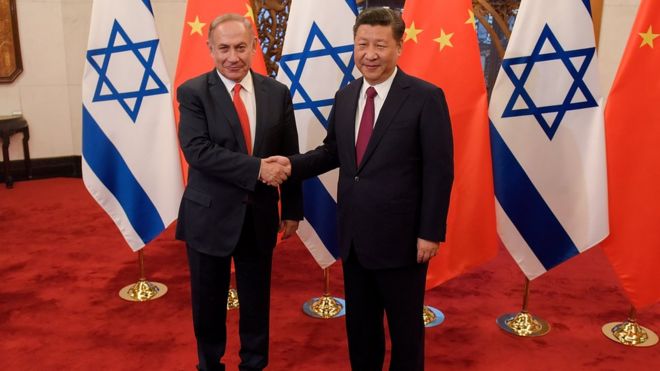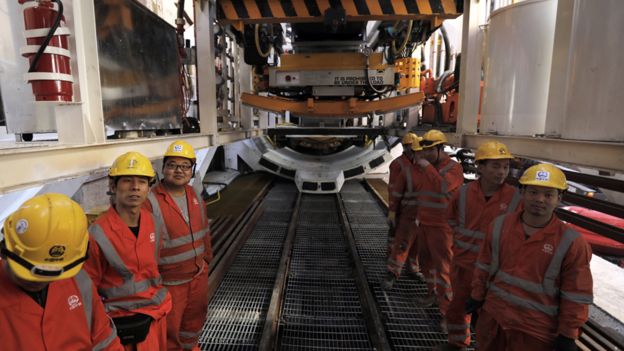| 發表文章 | 發起投票 |
China and Israel deepening trade ties

On paper Israel and China are unlikely close trading partners.
China, the world's second-largest country, is the biggest exporter on the planet. While Israel, a tiny strip of land in the Middle East, is only in 45th place on the global exporting league table.
And importantly - Israel has always been a steadfast ally of the US.
So given the current trading spat between the US and China, you would expect Israel to be firmly on the American side.
Yet what many people don't know is that Chinese investment in Israel is continuing to boom, at the same time as a growing number of Israeli firms are entering the Chinese marketplace.

So while President Trump is slapping tariffs on Chinese exports and talking tough, Israel's Benjamin Netanyahu is happily encouraging his country's firms to accept Chinese investments, as the figures show.
In 2016 China's direct investment in Israel almost tripled to $16bn (£12bn), according to a report in the South China Morning Post newspaper.
Meanwhile, the Jerusalem Post predicts that China will overtake the US as the number one source of overseas investment in Israel.
So what has brought the two countries together, and should Israeli firms be cautious?

To help bring Israeli and Chinese companies together, a number of business events are now held every year, such as Silicon Dragon Israel, which took place in Tel Aviv at the start of the year, and the China-Israel Innovation Summit, which was held earlier this month in Guangdong.
Rebecca Fannin, a founder of Silicon Dragon Israel, says Israeli tech start-ups that have secured Chinese investment tell her they "are progressing faster with Chinese capital, and through introductions, collaborations, and easier access to the large China mainland markets".
In recent years Israeli firms that have either been bought outright by Chinese companies, or sold them share of their business, include medical lasers operation Alma Lasers, and medical devices group Lumenis. Others are Israeli dairy business Tnuva, image recognition firm Cortica, and gesture control group Extreme Reality.
Royi Benyossef, an Israel-based manager at investment fund Samsung Next, says that the Chinese are "mesmerized by Israel and its technology exporting capabilities".
Other commentators say that the different national characteristics of the two countries complement each other.
Peggy Mizrahi, a Chinese citizen who lives in Israel, says: "The Chinese are known for long-term planning, and being conservative and hierarchical, unlike the commonly recognised Israeli mindset of [being] fast, innovative, flexible, and having a lack of respect for authority."
Daniel Galily, an Israeli expat who has lectured in business at Beijing Geely University, adds that: "The educational system in China places great emphasis on discipline and obedience to superiors, while the Israeli educational system and the Israeli army encourage students and soldiers to think about new ideas, and to solve problems in situations of uncertainty.
"The Chinese understand that, and so they strive to integrate the Israeli creativity into their economy."
However, it is not just Chinese firms that are benefiting from closer trade ties between the two countries.
Spotad, an Israeli digital advertising firm, entered the Chinese market last year after securing funding from a Hong Kong-based private equity firm.
The company now works with all the major Chinese online advertising exchanges.
Other Israeli firms that are continuing to make inroads into the Chinese market include mobile marketing firm AppsFlyer, and diamond trading platform Carats.
https://www.bbc.com/news/business-44697662
本貼文共有 0 個回覆
此貼文已鎖,將不接受回覆
| 發表文章 | 發起投票 |

